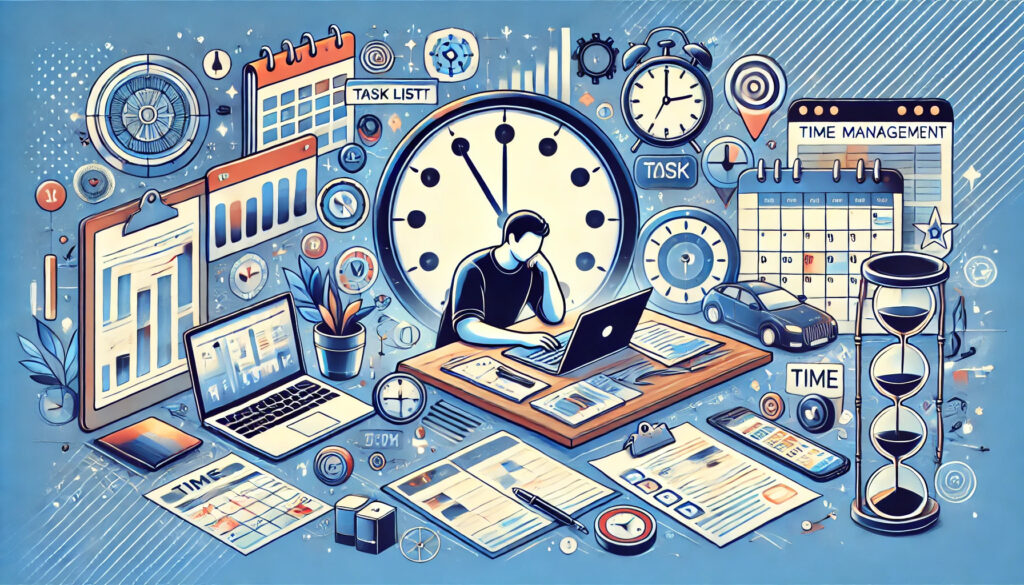Time Management and Personal Productivity: Keys to Success in Today’s Fast-Paced World

In today’s fast-paced world, where every moment is valuable, mastering time management has become an essential skill. We are constantly faced with numerous tasks, and to achieve our goals, we must optimize how we use our time. This blog explores several practical strategies for managing time effectively and boosting personal productivity.
1. Prioritizing Tasks: Identifying the Most Important Tasks
The first step in time management is recognizing and prioritizing your tasks. One popular method for this is the Eisenhower Matrix. This technique helps you categorize tasks based on their urgency and importance:
- Urgent and Important: These tasks require immediate attention. Handle them as soon as possible.
- Important but Not Urgent: These tasks are crucial for long-term goals. Plan and schedule them.
- Urgent but Not Important: Delegate these tasks if possible, or minimize the time spent on them.
- Not Urgent and Not Important: These tasks can often be eliminated to free up your time.
By systematically prioritizing tasks, you can focus on what truly matters and avoid getting bogged down by less significant activities.
2. Managing Interruptions and Distractions
Distractions are one of the biggest barriers to productivity. Whether it’s constant notifications on your phone or unexpected interruptions from colleagues, managing these distractions is crucial. Here are a few tips:
- Set Boundaries: Clearly define your working hours and let others know when you are unavailable.
- Use Focus Tools: Apps like Focus@Will or Pomodoro Timer can help you maintain concentration by structuring your work into focused intervals.
- Turn Off Notifications: Limit distractions by disabling non-essential notifications during work hours.
Reducing interruptions can significantly enhance your ability to stay focused and complete tasks more efficiently.
3. Leveraging Technology for Productivity
In the digital age, technology can be both a blessing and a curse. However, when used correctly, it can greatly enhance productivity. Consider the following tools:
- Task Management Apps: Tools like Todoist or Asana help you organize tasks, set deadlines, and track progress.
- Time-Tracking Software: Apps like Toggl allow you to monitor how you spend your time, helping you identify areas where you can improve.
- Note-Taking Apps: Evernote or Notion can be invaluable for keeping all your ideas, notes, and plans in one place.
By integrating these tools into your daily routine, you can streamline your workflow and maximize your productivity.
4. Setting SMART Goals
Setting goals is essential for productivity, but they need to be SMART: Specific, Measurable, Achievable, Relevant, and Time-bound. Here’s how to apply this framework:
- Specific: Define exactly what you want to achieve.
- Measurable: Establish criteria to track your progress.
- Achievable: Set goals that are challenging but within your capabilities.
- Relevant: Ensure the goal aligns with your broader objectives.
- Time-bound: Set a deadline to create a sense of urgency.
SMART goals provide clarity and direction, making it easier to stay on track and achieve what you set out to do.
5. The Importance of Rest and Reflection
Finally, while managing time and boosting productivity are important, so is taking time to rest and reflect. Burnout is a real risk when you’re constantly pushing yourself to achieve more. Make sure to:
- Schedule Breaks: Incorporate short breaks throughout your day to recharge.
- Reflect Regularly: Take time at the end of each day or week to review what you’ve accomplished and plan for the future.
By balancing productivity with rest and reflection, you can maintain high performance without sacrificing your well-being.
Conclusion
Time management and personal productivity are crucial skills in today’s fast-paced world. By prioritizing tasks, managing distractions, leveraging technology, setting SMART goals, and ensuring you take time to rest, you can enhance your productivity and achieve your goals more efficiently. Remember, it’s not just about working harder — it’s about working smarter.
Source : Medium.com




